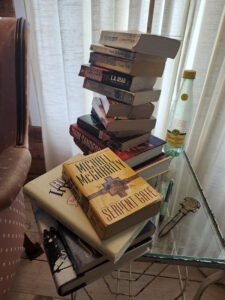 Oct 1, 2025–The more I read, the more I struggle finding stuff I want to read.
Oct 1, 2025–The more I read, the more I struggle finding stuff I want to read.
I’ve covered all the classics like Catcher in the Rye, assigned by earnest 11th-grade English teachers. I’ve consumed all the “flavor of the day” non-fiction, even almost making it through A Brief History of Time.
But lately I have been wallowing in the oeuvre of quick adventures, cheesy westerns, and pulpy detective novels.
We’ve never had cable and haven’t owned a TV since 1999, so I have only books to fill up those hollow hours between dinner and bedtime.
(By the way, The Golden Hub in Fredericksburg and the Dietert Center in Kerrville have giant book exchange collections where you can take home everyone else’s slightly-read cast-offs.)
As I finish a favorite author’s entire output, I am forced to branch off and find a new scribbler. This is a frustrating spelunk.
My quibble with most writers is that they love to write stories where NOTHING HAPPENS!
I’m not looking for a murder a minute or frenetic space wars, but lord spare me from the mindful meanderings of a troubled heroine. I don’t want 10 pages of introspection or clever dialogue. And I don’t want to wade through descriptions of the landscape–“the sunsets paint their pastel hues on escarpment canvases,” unless the escarpments are really aliens ready to start a space war and murder earthlings.
I thought I was alone in my obtuseness until I stumbled across Elmore Leonard’s Rules of Writing. I have yet to explore Elmore’s novels, but I sure see a fellow reader in his Rules.
1) Never open a book with weather.
This is a sin of bad novelists, lazy songwriters, and columnists on a deadline who have run out of ideas. Leave the weather forecast to Snoopy: “It was a dark and stormy night…”
2) Avoid prologues.
Yes yes yes. When I pick up a book, I want to start on Chapter 1, sentence 1, word 1. Leave out the Prologues, Forewords, Acknowledgments, and Flashbacks. I don’t care what happened to the protagonist’s great grandparents in 1903 in Brooklyn. If you must include this baggage, throw it in the trunk, next to the Appendix and Index, where it doesn’t get in the way.
3) Never use a verb other than “said” to carry dialogue.
The easiest “tell” of an average writer is one who seasons their works with “she gushed,” “he grinned,” or “she said cunningly.” Make their words do the gushing and grinning.
4) Keep your exclamation points under control.
Leonard allows no more than two or three per 100,000 words. I say he is too liberal. Banish them all! And never use more than one in a row!!!
5) Never use the word “suddenly.”
Guilty. When I was in 8th grade.
6) Avoid detailed descriptions of characters.
If you are like me, you skip over the paragraphs describing how chiseled is the chin of the handsome six-foot hero or the trim figure of the damsel of the day.
Descriptions don’t work, anyway. Each reader forms an image of the character in their head. We know this whenever some producer decides to turn a book into a movie. Except for the Harry Potter films, no movie characters ever look anything like the book characters we conjure.
Leonard summarizes nicely with:
7) Leave out the part that readers tend to skip.
“Think of what you skip reading a novel: thick paragraphs of prose you can see have too many words in them. What the writer is doing, he’s writing, perpetrating hooptedoodle, perhaps taking another shot at the weather, or has gone into the character’s head, and the reader either knows what the guy’s thinking or doesn’t care.”
Now go write that novel.